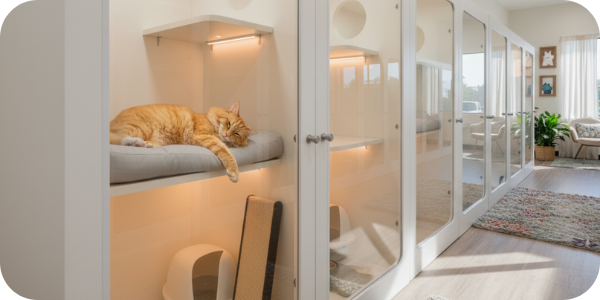When senior kitties are due to go into holiday boarding, owners can be understandably a little concerned about whether their beloved pet will cope. As nice as boarding facilities may be, they’re not your cat’s familiar home environment! The sights, sounds and smells of other cats can be stressful, and the change in routine may also upset more sensitive pets.
Here we’ll go through a few of the more common issues that older cats can experience in boarding, and how we can help give your pet a little extra pre-emptive medical support and TLC.
Common stress-related issues
When cats go into an unfamiliar environment, they may become stressed and temporarily “shut down”. This can lead to:
- Reduced eating, causing weight loss.
- Reduced drinking, leading to dehydration (which can also exacerbate any kidney or urinary issues).
- Reduced pooing, which can lead to dry faeces and constipation.
- Reduced grooming, leading to matting.
- Potential flare-ups of cat flu in chronic flu cats.
While many cats can cope with this temporary downturn in activities for 24-48 hours, older cats can be more at risk of developing associated unwellness, particularly if they already have an underlying health condition. Additionally, very sensitive cats may not eat, drink or toilet properly for several days, which can also put a strain on their little systems.
How we can help
It’s best to ensure that your older pet is in the best possible shape prior to going into boarding. We’d recommend that they undergo a senior health check within the 3-6 months prior.
Secondly, it’s a good idea to pick a boarding facility that offers pets additional behavioural support. This includes the use of calming pheromone diffusers and other measures such as providing covered shelters that cats can hide in to help them feel safe.
Lastly, if you know your pet is on the anxious side, have a chat with our vets about supporting them with safe temporary calming supplements or medications.
For more information on senior cat health, consult our feline-friendly team.

